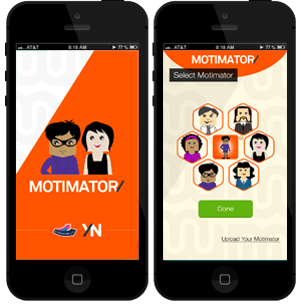Expert chat: Top tips for CVs and job interviews
 Kirsty works at global financial services firm UBS supporting change programs in the bank with program management standards and solutions. Here she shares her top tips for writing CVs and preparing for job interviews to land your dream career.
Kirsty works at global financial services firm UBS supporting change programs in the bank with program management standards and solutions. Here she shares her top tips for writing CVs and preparing for job interviews to land your dream career.
Poppy: Should you only have two pages on your CV? I do a lot of volunteering, but it's hardly on my CV because it'd be too long.
Kirsty: Yes, two pages is the best idea for a CV. The point of a CV is to be a good introduction and to make the hiring manager want to meet you for an interview, and so it's best to be as brief as possible. In terms of the volunteering - definitely make space for it! Often it might be the most relevant experience you have for the job you're applying for. If there's a lot of information, you could try grouping your experience together -- e.g. at one point in my career, I did loads of volunteer work for different conferences, so I stopped adding them individually and just put a section saying that I did 'conference planning, facilitating' etc and then below, what I gained from this. Remember that you don't actually have to list everything! If you feel like for certain types of jobs it's going against you, or if it's just not relevant and you can use the space on better stuff, just leave it off.
Abhi: How can I make my CV more concise?
Kirsty: It is actually best practice to tailor your CV to each job you apply for, by highlighting things that are most relevant and using less space on the ones that aren't. Make sure you're not including irrelevant things and really highlight your achievements - what was it you did, and why was it good? You don't have to put all the details - if the hiring manager wants to know more, they can ask you in person. Bullet points are great for keeping things short.
James: We also have a CV checklist on The Mix you could browse through.
Carl: What about explaining gaps? I've been lucky enough to travel abroad but there was also a period where I was caring for my family. How do I say this on a CV?
Kirsty: It's really up to you if you think it's a long enough period to be noticeable - if not, then maybe just do the application as normal and if someone asks about the gaps you can say that you took time off to care for a family member. Either way, this shouldn't be the focus of your application. Keep it more on what you would bring to the role. If you can show that you'd be great for the role and have passion for it, then they're not going to worry about those sort of details as much.
Jen: How do you show confidence at an interview?
Kirsty: There are a few things you can do here: Make sure you are really prepared for the interview. Going over practice questions beforehand and writing out answers to the hardest ones (e.g. the dreaded 'tell me about yourself') can really help you feel at ease. However, it's not a memory test, so once you've prepared you can still take your notes in. There's no shame in looking at your notes, in fact it shows that you are prepared and taking it seriously. You could also try practising beforehand with a friend.
Tara: How do you answer the "Tell me about yourself question" in the right way?
Kirsty: Luckily, it's usually the first thing they'll ask, so if you can trot out a prepared response, you will at least be starting on a high! Your prepared answer will depend on the job and the organisation, but in general it should be a mini-sales pitch for yourself. Who are you, what have you done (relevant to the job) and what are you doing now? Don't say anything too 'random' - interviews are definitely somewhere to play it a bit safe! Don't be afraid to be personable, though - they'll be looking for someone they'd be happy to be around for eight hours a day!
Maggie: What about the "What are your weaknesses" question? I always say "I'm not confident on the phone", but maybe I shouldn't say that?
Kirsty: Another tough question! You don't want to give a cop-out answer ("My weakness is I work too hard!"), but at the same time you don't want to make yourself sound unqualified. They're trying to find out if you are self-aware, that you can see where your abilities are and how you might improve them. If you already have an idea of one of your weaknesses, try and pair it with a positive statement. For example, "I'm not always confident speaking on the phone, so I make sure to prepare what I'm saying beforehand before making important calls." Another thing to try is to think about your strengths. Most things aren't black-and-white - there are pros and cons. For example, "I always take the initiative and push things forward, however I've recognised that I can be impatient sometimes and try and wait for input from others."
James: We have articles on interview tips, how to interview and an expert answer on how to prepare for an interview. You could also take a look at this article on the most common interview questions on Monster.com.
Sam: Do you need a CV to get an interview and, if you don't really have anything to put on it, what can you do?
Kirsty: This is a position everyone has been in - we all have to start somewhere! You probably will need a CV, although some places will accept an application form. For entry-level roles, you're not competing with someone with 20+ years experience, so it's OK for your CV to be short. If you don't have any work experience, focus on other things. What about school - were you in any clubs? Did you do any special projects? Write down anything at all that shows you as an individual and then put more detail in the cover letter. Why are you excited about this opportunity? Why do you think you would be good at it? For example, you might be super-organised, or you always help people out or do IT support for your friends and family etc. The hiring manager for an entry level role is looking for personality and drive, not years of experience.
Next Steps
- Download Motimator - an app that helps you get the career you want - by giving you a gentle kick up the ass each day when motivation is running low.
- Prospects is the UK's official graduate jobs website.
- Chat about this subject on our Discussion Boards.
Updated on 29-Sep-2015
No featured article














